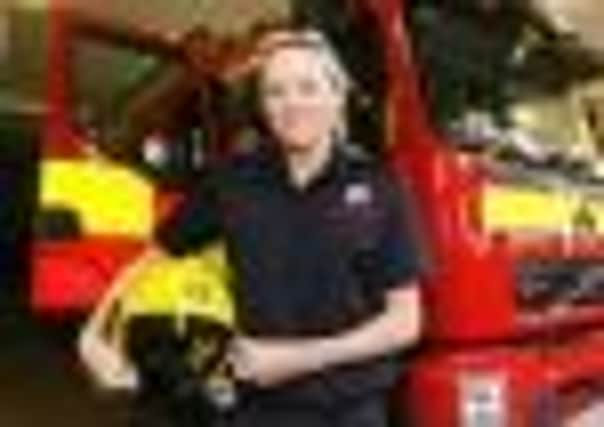Fire Service turns up the heat in search of local female recruits


Ten years on, the number of women joining the service has steadily increased with 46 females currently in the service and Paula is encouraging local women to consider a career as a fire-fighter
Paula - who is based at Ballymena Fire Station - admits that joining a male-dominated profession was daunting at first but that her fears quickly subsided.
Advertisement
Hide AdAdvertisement
Hide Ad“I knew I wanted a job that would offer something different, something challenging and that’s why I settled on the Fire Service,” Paula said.
She added: “When I joined I was just one of a very small handful of females in the service but I’m glad to see that numbers have been increasing.
“There’s no special treatment as a woman - we’re expected to do everything that our male colleagues do - and I wouldn’t expect it or have it any other way.”
Due to the nature of the work carried out by fire-fighters, Paula explained that she quickly felt part of the team.
Advertisement
Hide AdAdvertisement
Hide Ad“There really is a great sense of camaraderie; there’s plenty of banter - but then I suppose that’s the same for any job; certainly the sense of camarderie helps when you’ve had to deal with a difficult call-out,” Paula said.
She added: “It is high pressure and some of the situations we are faced with are quite tough but because we’re a tight-knit team we can talk to each other to deal with whatever has happened.”
During her 10 years of service, Paula admits there have been some extremely traumatic situations to deal with.
“As well as dealing with fires, we’re also called out to road traffic collisions and they can be particularly hard,” she said.
Advertisement
Hide AdAdvertisement
Hide AdShe added: “I know when I first joined I was worried about how I would deal with coming across my first fatality.
“When it happened, the training just kicked in - we are so well trained and I can’t emphasis that enough - that you didn’t have time to think really, you just got on with dealing with the situation.”
A ‘typical’ day for a fire-fighter is either off or on-station.
“If we’re on-station, we’ll be checking equipment, doing drills in the yard and working on our physical fitness,” Paula explained.
Advertisement
Hide AdAdvertisement
Hide AdShe added: “If we’re off-station, then we’re on call to go out to road traffic collisions and fires.
“We’ll also be out doing fire safety checks and meeting with, for example, community groups.
“The job has changed over the years and we provide a much broader fire and rescue service and respond to much more than fires.
“A lot of our work is pro-active and giving advice to try and prevent fires from happening in the first place.”
Advertisement
Hide AdAdvertisement
Hide AdAnd as for potential recruits, Paula has the following advice: “It is a physically demanding job; it’s tough and as a woman, you do the same as your male colleagues, there is no special treatment, nor should there be.
“But, it is an extremely rewarding job and the training given, both as a new recruit and then throughout your career, ensures that you are extremely well prepared which gives you the confidence to your job.”
The mum-of-one added: “I have a young daughter but the Fire Service has work-life balance systems in place which make it easier to be a mum and work at the same time.”
The Northern Ireland Fire & Rescue Service this week launched its recruitment campaign for Wholetime (fulltime) Firefighters and is encouraging more females to consider firefighting as a career.
Advertisement
Hide AdAdvertisement
Hide AdChris Kerr, Deputy Chief Fire Officer, Northern Ireland Fire & Rescue Service, said: “Our recruitment campaigns always reflect the high public esteem in which we are held as an Emergency Service as we never have any problem attracting large numbers of high quality applicants.
“What we really would like however is for more females in Northern Ireland to become Firefighters – and applying is taking that first step.
“We have a specific message for females across Northern Ireland in this recruitment drive - being a fire-fighter is a remarkable, challenging and rewarding career and it is an equally viable long term career option for both women and men.”
All candidates who apply and who meet the minimum educational qualification of GCSE Maths and English (A-C Grade) will be invited to attend a multi-stage fitness test. Successful candidates from the fitness test will go forward for shortlisting based on their application form and if shortlisted will be invited to a practical test. If successful in that stage candidiates will then progress to the interview stage.
Advertisement
Hide AdAdvertisement
Hide AdIt is anticipated that the first course of Trainee Firefighters will be appointed and will commence their 18-week training course at the Fire & Rescue Training Centre early in 2012.
For further information about the recruitment campaign and to download applications packs go to the NIFRS website www.nifrs.org The closing date for applications is Thursday, August 11 at 3pm.